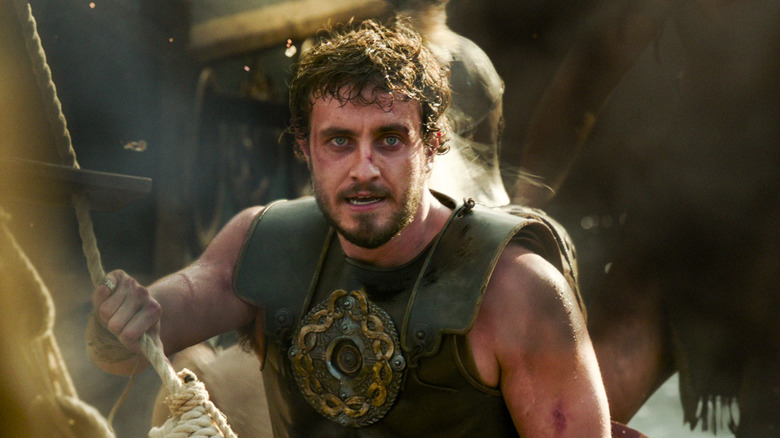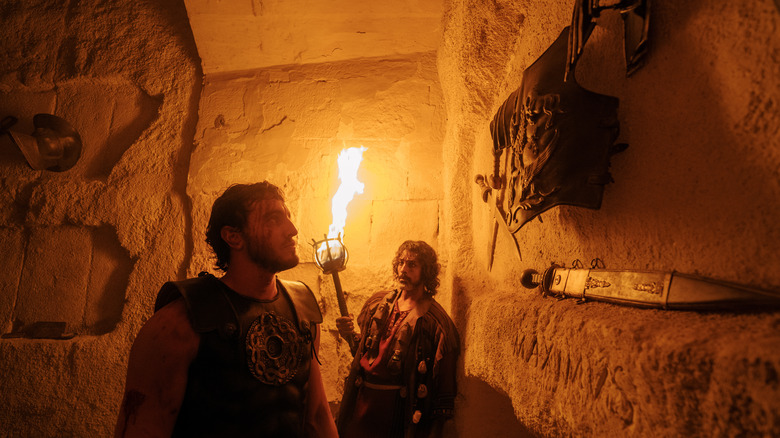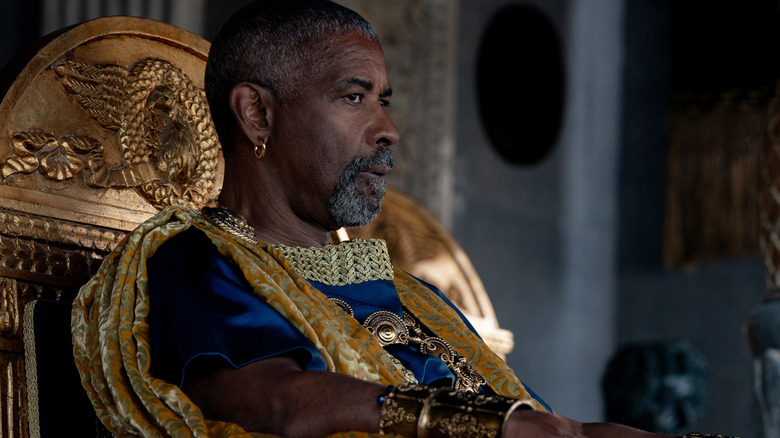Why Gladiator 2 Owes A Debt To One Of Shakespeare’s Most Famous Plays
This article contains spoilers for “Gladiator II.”
There’s a school of thought that all modern forms of drama have their origin in the works of William Shakespeare. While the people who would claim this are most likely devotees of the Bard’s works, they do have a point, insofar as the sheer enduring popularity of Shakespeare’s plays has kept them relevant for centuries and, thus, highly influential. Even though Shakespeare’s use of Iambic Pentameter remains preserved in amber (thus confounding generations of high school students and theatergoers alike), the characterizations, tone, and plotting exhibited in so many of his classics continue to crop up in the most unlikely of places. Heck, his play “Much Ado About Nothing” just got reimagined into a rom-com box office hit in the form of last year’s “Anyone But You.”
On the whole, Shakespeare’s history plays are less known and less popular than his comedies like “Much Ado,” or his tragedies like “Romeo & Juliet,” “Hamlet” and others. Still, they retain some influence, especially over shows and films that are period pieces themselves, as the Bard’s plays were when they were first written and performed. The original “Gladiator” contains some notable homages to Shakespeare, both in the general tenor of its story recalling “Julius Caesar” as well as its plot containing elements of “Titus Andronicus.” It’s no big surprise, then, that “Gladiator II,” directed by Ridley Scott and written by David Scarpa, should have a Shakespearean tenor to it. What is a little surprising, however, is that the history play which the sequel most borrows from isn’t a Roman history, but an English one, as “Gladiator II” contains a structure, twists and turns which owe a debt to Shakespeare’s “Henry IV, Part 1.”
‘Gladiator II’ borrows the concept of a boy king in hiding from ‘Henry IV’
“Henry IV, Part 1,” written sometime around 1597, takes place between 1402 and 1403. It chronicles the attempts by King Henry IV and his loyalists to quell a growing rebellion being raised by the Earl of Worcester and the House of Percy, all while Henry’s wayward son, Prince Hal, fritters away his time drinking in pubs with his best pal, the gentleman knight (and lover of drink) Falstaff. As things heat up between the King and the Rebels (whose numbers grow to include the Welsh and Scots, too), Hal is compelled to turn his attentions away from his childish distractions and back to the problems of England and the Court. Eventually, he meets one of the Percy’s, a particularly quick-to-anger man named Hotspur, at the close of the Battle of Shrewsbury. Hal’s defeat of Hotspur marks the end of his wayward youth, and he goes on to accomplish even greater feats in “Henry IV, Part 2” and “Henry V.”
Prince Hal in “Henry IV, Part 1” is one of the key characters in drama to establish what is now known as the “Hero’s Journey,” according to “The Hero With a Thousand Faces” author Joseph Campbell. Although Hal is not necessarily in hiding — even if he’s skirting his duties, the King as well as many citizens of England know who and where he is — the way Shakespeare uses him dramatically sets the stage for many a “Chosen One” narrative, from “The Matrix” to “The Princess Diaries.” In “Gladiator II,” the character of Lucius (Paul Mescal) is this Prince Hal archetype: he takes on a new name for himself, Hanno, while living outside of Rome after being sent away by his mother Lucilla (Connie Nielsen) after the events of the first “Gladiator.” Although it’s possible that Lucius legitimately forgot his Roman heritage after living in Numidia for so long, it feels more likely that he willfully rejected his legacy, choosing to keep his parentage a secret in favor of becoming a slave put into the gladiator games upon his capture. And, just like Hal becomes Henry V, Lucius eventually sees the value in standing up for what his family, especially his late father Maximus (Russell Crowe), believes in: a “dream of Rome” that involves strength and honor instead of decadence and/or nihilism.
‘Gladiator II’ also contains a Falstaff and a few Hotspurs
While the Prince Hal/Lucius Verus comparison is the main DNA that “Henry IV, Part 1” and “Gladiator II” share, that doesn’t mean there aren’t other similarities between the play and film, too. Throughout the film, Lucius has a few mentor figures he looks up to, including the brave Numidian chieftain Jubartha (Peter Mensah), whose strength and nobility is in stark contrast to the pillaging armies of Rome. Later, during his time in the arena, Lucius meets Ravi (Alexander Karim), a former gladiator who has now chosen to serve as a doctor to other injured gladiators. While Ravi certainly isn’t a big, boastful drunkard like Falstaff, he does provide Lucius with some similar perspective and levity. Not to mention that one of Ravi’s cure-all’s is a toke off his opium pipe, making his character a similar lover of substances like Falstaff.
Then there are the Hotspurs of “Gladiator II,” with the spirit of Harry Percy split between two characters. The brother Emperors Geta (Joseph Quinn) and Caracalla (Fred Hechinger) represent Hotspur’s function as both a devious tactician and a mad wild card, respectively. Ironically, though Lucius meets both characters and is given no reason to respect either one, there is no moment of face-off between these villains and our hero. Instead, a third villain emerges from the shadows right under Lucius’ nose: his owner, Macrinus (Denzel Washington). A former slave himself, Macrinus has a bit of Hotspur’s nihilism, but his cunning and personal involvement with both Lucius and Lucilla make him hew closer to the play’s Thomas Percy, Earl of Worcester, the mastermind behind the rebellion.
All of this goes to show just how steeped in history Scarpa and Scott were when conceiving “Gladiator II.” No, they weren’t necessarily delving into literal, actual history; Scott has made no bones about the fact that he doesn’t give a toot about historical accuracy in his films several times over. Instead, they were clearly aware of and paying homage to dramatic history, with these homages acting as demonstration of their understanding of how a good, rousing historical epic functions. Scott, like Shakespeare, knows his audience, and both know the importance of a ripping good yarn.
“Gladiator II” is in theaters everywhere.

















Post Comment